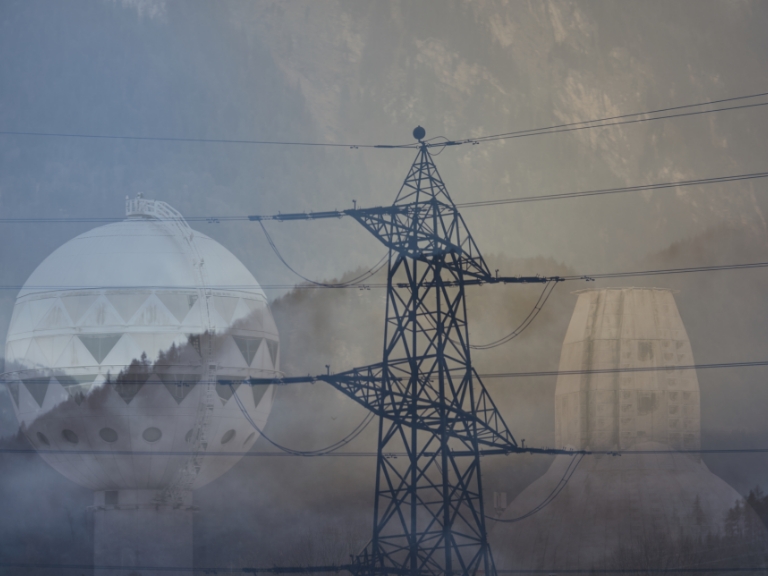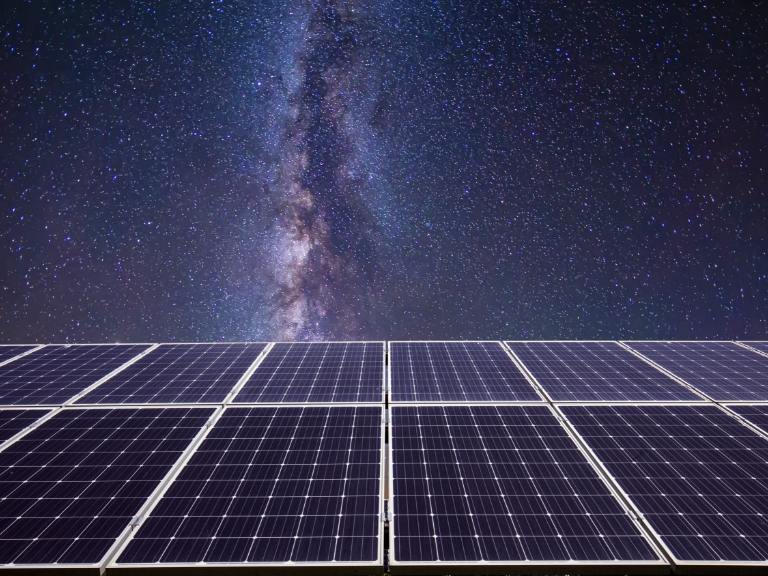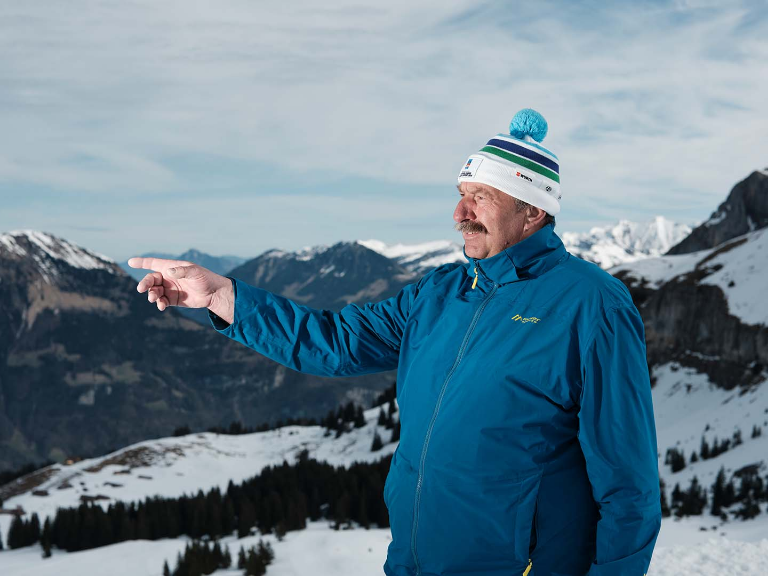In focus
Can we achieve the energy transition?
Renewable energies are to be expanded, but there is resistance to specific projects. How can we achieve the energy transition by 2050? An interview with political scientist Isabelle Stadelmann, economist Doina Radulescu and Cornelia Mellenberger, CEO of Energie Wasser Bern.
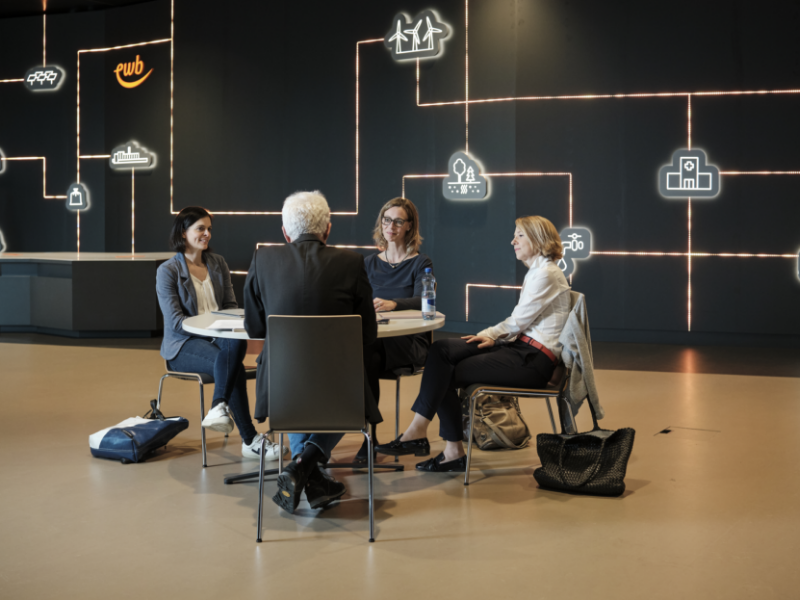
Cornelia Mellenberger: It is a democratically set and very ambitious objective. The energy transition is in full swing and EWB is doing everything it can to achieve its goals – for example by investing in the production of renewable energies or expanding district heating. Yes, I think we can achieve it.
Ms. Stadelmann, your research focuses on the acceptance of climate policy measures. Will the population join in?Isabelle Stadelmann: Well, you don’t want to lose hope. People are basically in favor of the energy transition, but when it comes to building a plant in a specific location, enthusiasm fades. However, this will continue to occupy us beyond 2050.
Doina Radulescu: An exit from coal could work. However, we will still need gas to cover electricity production during peak load periods and fossil fuels for road transport and heating. Another major challenge is the willingness of the population to pay, as the energy transition is not free.
“In Switzerland, you find majorities when measures don’t go too far.”
Isabelle Stadelmann-Steffen
The dilemma was also apparent in the Electricity Act: At first, everyone agrees. Environmental associations then oppose individual projects and the Swiss People’s Party (WVP). Is this a classic pattern for Switzerland?Isabelle Stadelmann: You also have to see the positive side: Both the Swiss Electricity Act and the Solar Express saw large majorities in parliament for the expansion of renewable energies for the first time in Switzerland. Just five years ago, it was unthinkable that the center party Die Mitte and the FDP together with the Green Party, left, and even parts of the SVP would come up with such a proposal. This testifies to a widespread awareness that something has to happen. The opposing environmental associations are two smaller organizations. The major associations say yes.
About the person
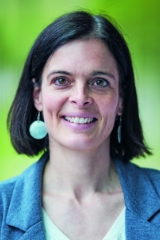
Isabelle Stadelmann-Steffen
is Professor of Comparative Politics and focuses on political behavioral and attitude research. She is currently conducting research on Swiss energy policy and the role of citizens in projects supported by the Swiss National Science Foundation and the Swiss Confederation.
Doina Radulescu: People are not always convinced of the effectiveness of measures aimed at expanding renewable energies. Research also shows that incentive taxes such as a CO2levy are more likely to be accepted if they are at least partially reimbursed.
Cornelia Mellenberger: Everyone is faced with a major challenge – companies, politics, society and, not least, individuals as a result of changes in behavior. It is also important not to play individual energy sources off against each other.
Ms. Stadelmann, you once wrote, however, that tax refunds are unlikely to impress people.Isabelle Stadelmann: From an economic point of view, a CO2levy is the best way to effect a change in behavior. Our studies also showed that people are very much in favor of a levy if they are shown how much they pay and how much they get back when it is introduced. But as soon as we mentioned that the levy is politically controversial, people didn’t care so much about the refund. This shows how politicized the debate is. That’s why I’m skeptical about whether a CO2levy can be a key measure for making the energy transition work.
Subscribe to the uniAKTUELL newsletter

Discover stories about the research at the University of Bern and the people behind it.
Isabelle Stadelmann: This is where the social aspect comes into play. The people who by far fly the most are the one percent of the super rich. The tax would have to be enormous to stop them from flying. In addition, the political debate then quickly declares: Only the rich can fly. This is what happened when the CO2Act was rejected in 2021.
Cornelia Mellenberger: There is a gap between the very long-term debate on the energy transition and the necessary investments. EWB will be investing a lot of money in renewable production and the grid over the next 10 to 20 years. The benefits for the energy transition are not yet immediately apparent. But if we are one day able to benefit from environmental heat from bodies of water or photovoltaic systems, the investments will be worthwhile. This is because the sun, wind and water are free of charge as “operating materials” and the operating costs are quite competitive in the long term.
“An electricity agreement with the EU is key to Switzerland’s long-term security of supply.”
Cornelia Mellenberger
Ms. Stadelmann, in a study you write about the population’s “risk and cost aversion” that makes progress in the expansion of renewable energies more difficult. Doesn’t that make everything very difficult?Isabelle Stadelmann: In the case of subsidies, this only applies to a limited extent. Subsidies are often more popular with the population than incentive taxes because the benefits are immediately apparent.
Cornelia Mellenberger: We also see the opposite effect when it comes to expanding district heating in the city of Bern: Many homeowners are now deciding to switch their heating to district heating in four years’ time, for example, because they see long-term benefits. The costs will be lower over the entire life cycle and they no longer have to spend on maintenance.About the person

Cornelia Mellenberger
has been CEO of Energie Wasser Bern (EWB) since the start of 2022. She studied economics and business administration with a minor in political science at the universities of Bern and Madrid. She worked as a business consultant and spent more than ten years at SBB, where she was a member of the Executive Board and Deputy Head of Passenger Services Markets.
Cornelia Mellenberger: There are many listed buildings in the city of Bern. This makes the expansion considerably more difficult. In addition, not every building is suitable for photovoltaic systems. EWB tries to implement large-scale facilities where possible, such as the ground-mounted facility at Belp Airport in co-production with partners. We also pay a fair return delivery rate. In addition, every property owner is free to decide whether they want to install a system on their roof.
Doina Radulescu: The expansion of photovoltaics in Switzerland is also being made more difficult by the fact that most households are tenants and not owners. The tenants benefit, but the owners bear the costs.
Should the true costs of fossil fuels be charged in general – including the environmental costs of production and consumption?Doina Radulescu: Of course, theoretically. But at what rate exactly should the environmental costs be estimated? Road traffic, for example, is not just about environmental damage, but also about congestion costs and accidents. Ideally, we should correctly quantify these external costs and levy the same amount.
How much would energy consumption decrease if true costs were charged?Doina Radulescu: That is difficult to predict.
Isabelle Stadelmann: Political aspects also play a role here. If a family with children can no longer afford energy, this is no longer politically feasible.
All in all, do you advocate a mix of subsidies and steering?Isabelle Stadelmann: In Switzerland, you find majorities when measures don’t go too far. At the end of the day, this boils down to a system in which something of everything is done. The major reform, the conversion to a steering system, is almost impossible to manage. The same applies to the systems: We will not be paving the Alps with solar panels or installing wind turbines everywhere. But photovoltaics here, wind turbines there, support here, control there – this is politically feasible.
Are bans also needed? Ms. Stadelmann once wrote: “Bans and regulations, as unpopular as they may be, may work better.”Isabelle Stadelmann: Bans are often perceived as fairer. A reduction in short-haul flights, for example, is unlikely to be achieved by raising prices through taxes alone. People with higher incomes will also pay that price. If you want to prevent short-haul flights, you can only do so with a ban.
A ban on the installation of oil-fired heating systems once failed in the Canton of Bern.Isabelle Stadelmann: Yes. However, this ban may not be necessary at all, because the incentives and the trend are already strongly headed in this direction. We need to discuss bans if only because this would make the incentive mechanisms for switching seem more attractive.
About the person

Doina Radulescu
is Associate Professor for State and Market at the Competence Center for Public Management at the University of Bern. Among other things, she conducts research on the impact of measures to promote renewable energies and of electric vehicles and on the redistributive effects of energy expenditure.
Doina Radulescu: As an economist, I prefer market-based instruments to dictates and bans. The latter do not take efficiency aspects into account and may also have undesirable consequences.
The question is, does the climate crisis have to have even more dramatic effects before energy consumers really understand and bans become unavoidable?Cornelia Mellenberger: Recently, we have been lucky with the last two winters being warm. However, the situation remains tense. In a really cold European winter, energy could be scarce.
Isabelle Stadelmann: People just have the feeling that things are not going to get that far in Switzerland. But here’s the thing: The willingness to act comes in crises. We are still in too good a position to make far-reaching changes in behavior. Ultimately, we need the will of society to switch to renewable energies.
What would the liberalization of the electricity market bring? Would suppliers increasingly opt for renewable energies, or would there be a price war?Doina Radulescu: Liberalization would not lead to a jungle. Liberalization may be important if households were more involved.
Cornelia Mellenberger: It is important that liberalization does not jeopardize the energy transition. Accompanying measures are needed to ensure that major investments in renewable production and grid expansion for the switch to renewable energies do not compete with each other.
Doina Radulescu: Why aren’t there cheaper tariffs for customers who temporarily cut off their supply in the event of power shortages?
Cornelia Mellenberger: The reliable, comprehensive supply of electricity and water is part of the public service in Switzerland and an important success factor for our country. We should definitely stick to that.
“The energy transition is not free.”
Doina Radulescu
Doina Radulescu: I just wanted to point out that we could discuss different tariffs on the basis of different preferences in terms of the security of supply, just as we discussed dictates and bans earlier.
Isabelle Stadelmann: Nowadays, electricity providers give you the option of ticking a box to indicate whether you want a greener product or not. But in fact this is a voluntary donation because you receive the same electricity as your neighbor, who uses cheap electricity. This makes it difficult for consumers.
According to a study by the International Monetary Fund, around 7 trillion US dollars were invested in fossil fuel subsidies in 2022 as a result of the energy crisis. How is this to be understood?Doina Radulescu: It is not clear to me what exactly this study includes. For example, does this include subsidies for households due to the rise in gas prices resulting from the war in Ukraine? However, these were introduced to cushion the negative effects.
Cornelia Mellenberger: I felt the same way. I don’t know the study. Did it take into account the subsidies for coal-fired power plants in Germany during the war?
Isabelle Stadelmann: Subsidies for fossil fuels are often justified with the argument of maintaining the workforce. Former US President Donald Trump once conducted a corresponding election campaign in coal mining areas. Surveys show that even climate-conscious people in coal-producing countries are less committed to switching to renewable energies.
What about Switzerland? Isn’t natural gas also co-fired in incineration plants?Cornelia Mellenberger: On peak load days, we use natural gas when the refuse or wood chips are insufficient. In industry, too, there will continue to be gas consumption during peak load periods. This is why when it comes to waste incineration, we want to process waste into bales and store it so that we can incinerate it when we need more heat. We are also installing a heat feedback system that can store heat from March to autumn. And finally, we are currently reviewing the geo-storage facility.
The operating lives of the nuclear power plants are to be extended. Do we need nuclear power to make the exit?Cornelia Mellenberger: The people of the city of Bern decided at the ballot box to phase out by 2039. EWB intends to stop using energy from the Gösgen nuclear power plant from the end of 2039.
What is the situation nationally?Doina Radulescu: Decarbonization is driving electricity consumption up sharply. I am in favor of technology neutrality. Technologies are also evolving. Without nuclear power, the energy transition will be difficult.
Isabelle Stadelmann: There is currently a ban on the construction of new nuclear power plants. There are different ways of generating enough electricity without nuclear power by 2050. I’m not ruling out the possibility of nuclear power becoming an option again after 2050. However, it is not expedient to discuss nuclear power at the moment, because no new nuclear power plant could be commissioned before 2040 anyway. In addition, it would probably have to be financed by the federal government, because no one wants to invest in nuclear power anymore. I fear that a debate on nuclear power will slow down the expansion of renewable energies. In that case, we would actually have a problem in 2050.
Why do you think a nuclear debate would put the brakes on renewables?Isabelle Stadelmann: In the political debate, nuclear energy is presented as an easy way out. This gives the public the impression that, “If the phase-out doesn’t work out, we’ll still have nuclear energy.” This reduces the pressure felt when switching. Investors are also becoming increasingly uncertain when it comes to renewable energies.
Then would it not be a golden solution to co-finance France’s expansion of nuclear energy and renew participation through state treaties?Isabelle Stadelmann: From 2025, the EU wants to export 70% of its energy only within the EU. This raises the question of whether there will still be enough electricity for Switzerland.
Doina Radulescu: The opposite narrative of the expansion of renewable energies, which solves all problems, is that of nuclear power as a fill-in. It’s about a combination.
Isabelle Stadelmann: The technology ban on nuclear power plants is likely to come to an end at some point. What we don’t know is: What technology would people choose if they could choose freely? Hydropower and photovoltaics on buildings rank high in the popularity stakes of energy sources. Electricity imports are the least popular. Wind, large-scale photovoltaic systems, nuclear power and small-scale hydropower are in the midfield. I am not sure how people would decide between nuclear and wind power, for example. Both technologies are disliked by significant sections of the population.
But we urgently need an electricity agreement with the EU?Cornelia Mellenberger: Let’s put it this way: We remain dependent on foreign countries for our energy supply. An electricity agreement with the EU is key to Switzerland’s long-term security of supply.
Isabelle Stadelmann: We cannot have completely unspoilt Alps and a 100% renewable domestic electricity supply. It takes compromises and considerations. Do we want more electricity from French nuclear power plants or more energy infrastructure in the Alps?
Doina Radulescu: In the long term, we are not only dependent on foreign countries for our electricity supply, but also for our climate. As droughts increase, the generation of electricity from hydropower becomes increasingly problematic.
The Swiss Federal Office of Energy says it is possible to reduce energy consumption by over 20% without compromising on comfort. Do we also need to change our lifestyle?Cornelia Mellenberger: We have identified a great deal of potential for savings when it comes to advising companies on energy: Does the corridor always have to be ventilated? Does the heat lamp have to be on all the time, even if you don’t cook until lunchtime? Could the server room be cooled down less? If companies make an effort to save energy, this can also boost their image.
Isabelle Stadelmann: The rejection of the CO2Law in 2021 triggered a fear in politicians to talk about saving. Any change in behavior is seen as an encroachment on freedom and personal responsibility. In line with the motto: “I won’t let anyone tell me how warm my home should be.” But if we’re honest, we’d also have to talk about personal behavior. You shouldn’t fly to Mallorca twice a year for a week’s holiday.
Magazine uniFOKUS
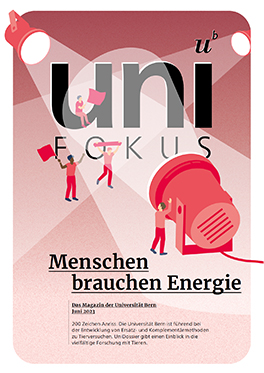
People need energy
This article first appeared in uniFOKUS, the University of Bern print magazine. Four times a year, uniFOKUS focuses on one specialist area from different points of view. Current focus topic: Energy
Subscribe to uniFOKUS magazine